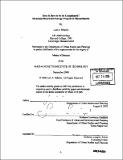| dc.contributor.advisor | Lawrence Susskind. | en_US |
| dc.contributor.author | Riberio, Lori A. (Lori Ann) | en_US |
| dc.contributor.other | Massachusetts Institute of Technology. Dept. of Urban Studies and Planning. | en_US |
| dc.coverage.spatial | n-us-ma | en_US |
| dc.date.accessioned | 2007-06-28T12:21:59Z | |
| dc.date.available | 2007-06-28T12:21:59Z | |
| dc.date.copyright | 2006 | en_US |
| dc.date.issued | 2006 | en_US |
| dc.identifier.uri | http://hdl.handle.net/1721.1/37677 | |
| dc.description | Thesis (S.M.)--Massachusetts Institute of Technology, Dept. of Urban Studies and Planning, 2006. | en_US |
| dc.description | Includes bibliographical references (leaves 95-97). | en_US |
| dc.description.abstract | This thesis examines municipal implementation of renewable energy projects in Massachusetts. It explores projects that have been planned and completed, drivers for municipal adoption of renewable energy, the implementation experience, barriers, and key success factors. The data presented include a survey of Massachusetts municipalities, stakeholder interviews, and an in-depth case study of a solar Brightfield project implemented in Brockton, Massachusetts. The case study describes in detail the city's experience implementing a "Brownfields to Brightfields" solar project initiated through the US Department of Energy's Brightfields program. The Brockton Brightfield is a 425 kW utility scale solar array on a former brownfield site. The case study of Brockton's Brightfields experience reveals a series of obstacles and success factors that ought to be considered in future efforts to implement municipal renewable energy projects. The barriers include inadequate government resources and capacity building dedicated to program implementation; institutional policy barriers (requiring legislative fixes), and the complexity surrounding the joint action required to navigate the administrative processes involved. The thesis concludes with a series of policy recommendations. | en_US |
| dc.description.abstract | (cont.) Recommended state legislative changes include 1) providing municipalities explicit legal authority to finance, develop, operate and maintain alternative energy projects; 2) increasing the allowable length of time for municipal borrowing for alternative energy from ten to twenty years; 3) clarifying procurement regulations; 4) increasing the net metering limit; 5) modifying interconnection standards to allow electricity generated at one municipal site to be used at another; and, 6) allowing third party behind the meter power sales. The thesis further recommends both federal and state adoption of sufficient and consistent grant and financing programs required to assist local governments. Finally, the thesis identifies a provision in the Massachusetts constitution regarding protection of open space and conservation land that municipalities must be aware of in identifying municipal land available for renewable energy projects. Special legislation may be required for individual projects. | en_US |
| dc.description.statementofresponsibility | by Lori A. Riberio. | en_US |
| dc.format.extent | 115 leaves | en_US |
| dc.language.iso | eng | en_US |
| dc.publisher | Massachusetts Institute of Technology | en_US |
| dc.rights | M.I.T. theses are protected by copyright. They may be viewed from this source for any purpose, but reproduction or distribution in any format is prohibited without written permission. See provided URL for inquiries about permission. | en_US |
| dc.rights.uri | http://dspace.mit.edu/handle/1721.1/7582 | |
| dc.subject | Urban Studies and Planning. | en_US |
| dc.title | Does it have to be so complicated? : municipal renewable energy projects in Massachusetts | en_US |
| dc.type | Thesis | en_US |
| dc.description.degree | S.M. | en_US |
| dc.contributor.department | Massachusetts Institute of Technology. Department of Urban Studies and Planning | |
| dc.identifier.oclc | 124509055 | en_US |
